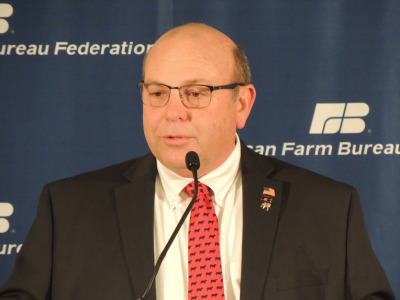President Donald Trump spoke to the American Farm Bureau Federation for the second year in a row – as they celebrated their 100-year anniversary this week and cheered his arrival and comments. The crowd provided over a half dozen standing ovations and numerous cheers.
Yet, when AFBF voting delegates got down to business, they shifted their stance on immigration policy and also moved to challenge Trump to re-enter the Pacific Rim trade agreement and stop the use of tariffs – representing subtle, yet significant shifts for the nation’s largest farm organization. The immigration text also represented a mending of fences after a brief split between state and national lobbying efforts.
The new text, brought forth by California Farm Bureau and approved by the AFBF delegates yesterday in New Orleans, extends protected status to the spouses and minor children of farmworkers seeking to earn permanent legal status. California Farm Bureau President Jamie Johansson said it allowed the organization to go a little further in offering support to farmworker families than did last year’s legislation from former Rep. Bob Goodlatte, R-Va.
“The Goodlatte bill that was introduced that was in Congress last year really made provisions for workers to get adjusted status, but it forgot that a worker getting adjusted status would expose his family, his wife and children,” Johansson told Agri-Pulse. “It’s unrealistic to expect that an individual would turn on their family that way to participate in a program that we want them to participate in."
Farm labor was the subject of a private meeting at the convention among state and national leaders. Last year, California broke from AFBF in its approach to the Goodlatte bill, but Johansson described the meeting positively and said the new Congress in Washington “gets us back on the same page.” AFBF President Zippy Duvall described last year’s split as one of process, saying “it wasn’t about the content that we disagreed on.”
Delegates sparred over language that would put AFBF on record in support of trade negotiations and against tariffs and withdrawal from trade agreements as a way to solve trade disputes. Arkansas Farm Bureau President Randy Veach argued that the proposed language would limit the President’s ability to negotiate and wanted the language removed. North Dakota President Daryl Lies agreed.
“Tell me how you get someone to negotiate if you don’t have every tool in the toolbox,” Lies said. “Are we going to invite them for pie and ice cream? Is China going to respond for that?”
Missouri Farm Bureau President Blake Hurst made a case for keeping the new language, saying “it’s a core belief of this organization that trade is important” and that “some negotiating tactics just don’t work.” Veach’s amendment to delete the new language was defeated 114-225.
Policy was also added to “support federal assistance for producers who have been displaced by retaliatory tariffs during trade negotiations.”
Farm Bureau voters also addressed the issue of cultured meat through a new section of policy denoting the nomenclature, regulatory structure, and sales procedures the organization wants to see used for the new technology.
Specifically, AFBF delegates voted for primary regulatory oversight by USDA’s Food Safety and Inspection Service, disclosure of commingled lab-grown product with traditionally produced product, barring the use of traditional protein sector titles on packaging, and calling on environmental claims to be backed by “USDA as a regulatory agency and based on sound science.”

AFBF President Zippy Duvall
The major issue, Duvall told reporters after the session, is “that they do not use those names that tie it to beef, chicken, pork ... things that we know cell-based food is really not. … We’re not going to be able to head it off, it’s coming, we need to make sure that it’s regulated by USDA and make sure it’s named properly.”
AFBF delegates offered several amendments designed to offer more support for struggling dairy farmers, including a new supply management system and changes in federal milk marketing orders. Debate focused on whether or not there should be additional methods of price support at the federal level. But the only changes included language calling for federal milk marketing orders 5 and 7 to be based on multiple component pricing instead of skim/fat pricing and for whole milk being promoted and advanced through the special milk program in schools, welfare groups and the U.S. military.
However, they also directed the board to conduct a review of the Federal Milk Marketing Order through a producer-led coalition that includes co-ops and processors. The review is to look at ways to modernize the current federal milk marketing order system.
In a discussion reminiscent of the 2018 House farm bill debate, Farm Bureau delegates voted to add language calling on able-bodied adults without dependents to work or participate in job training to receive government benefits.
Finally, delegates approved a “sense of the delegate body” calling on Congress and the Trump administration to work toward reopening the government. North Carolina Farm Bureau President Larry Wooten offered the resolution, saying it was important for AFBF members to use their event to sound off on the stalemate in Washington.
“For us to leave this convention without saying something to the impact this is having on American agriculture … we would be remiss in not doing that,” Wooten said.
Duvall said administration and congressional officials are well aware of Farm Bureau’s opinion on the subject — he want as far as to mention discussions he had with Ag Secretary Sonny Perdue over the weekend — but admitted AFBF “could push a little bit harder.”
“I think that’s a pre-warning of everybody getting louder. Our delegates are going to go home and call their congressmen — whether they’re Republicans or Democrats — and say ‘we need to get this done.’”
For more news, go to www.Agri-Pulse.com



